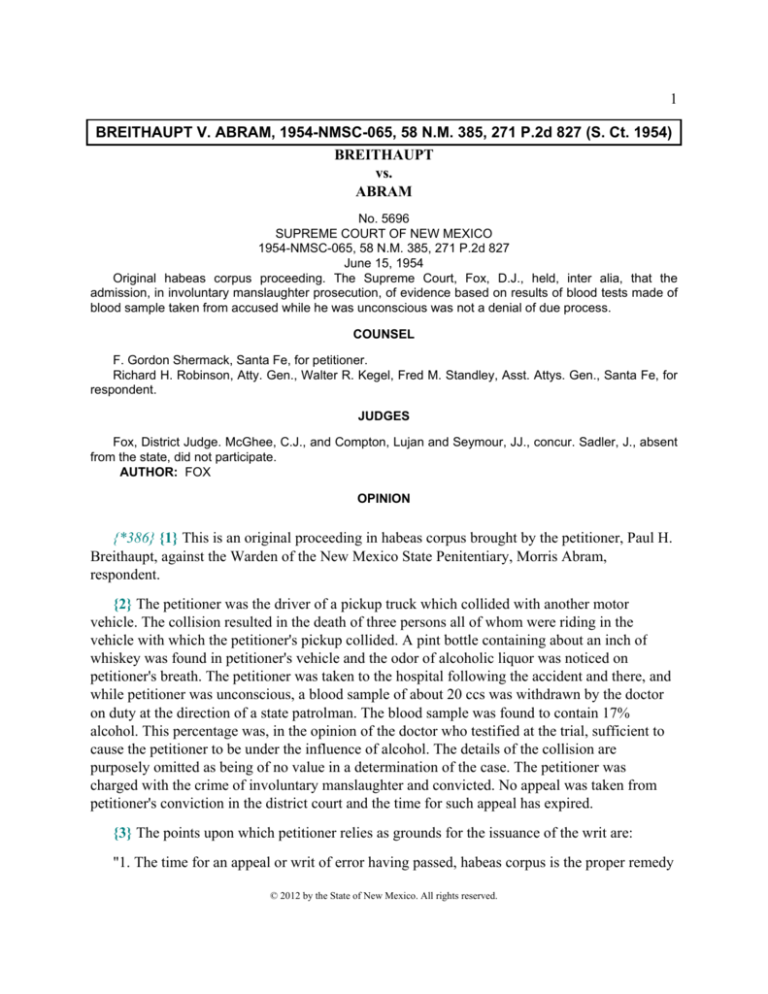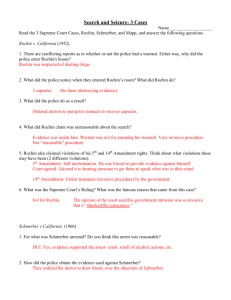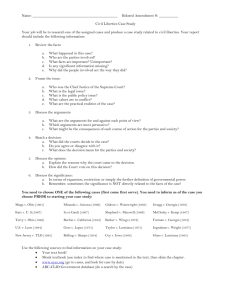
1
BREITHAUPT V. ABRAM, 1954-NMSC-065, 58 N.M. 385, 271 P.2d 827 (S. Ct. 1954)
BREITHAUPT
vs.
ABRAM
No. 5696
SUPREME COURT OF NEW MEXICO
1954-NMSC-065, 58 N.M. 385, 271 P.2d 827
June 15, 1954
Original habeas corpus proceeding. The Supreme Court, Fox, D.J., held, inter alia, that the
admission, in involuntary manslaughter prosecution, of evidence based on results of blood tests made of
blood sample taken from accused while he was unconscious was not a denial of due process.
COUNSEL
F. Gordon Shermack, Santa Fe, for petitioner.
Richard H. Robinson, Atty. Gen., Walter R. Kegel, Fred M. Standley, Asst. Attys. Gen., Santa Fe, for
respondent.
JUDGES
Fox, District Judge. McGhee, C.J., and Compton, Lujan and Seymour, JJ., concur. Sadler, J., absent
from the state, did not participate.
AUTHOR: FOX
OPINION
{*386} {1} This is an original proceeding in habeas corpus brought by the petitioner, Paul H.
Breithaupt, against the Warden of the New Mexico State Penitentiary, Morris Abram,
respondent.
{2} The petitioner was the driver of a pickup truck which collided with another motor
vehicle. The collision resulted in the death of three persons all of whom were riding in the
vehicle with which the petitioner's pickup collided. A pint bottle containing about an inch of
whiskey was found in petitioner's vehicle and the odor of alcoholic liquor was noticed on
petitioner's breath. The petitioner was taken to the hospital following the accident and there, and
while petitioner was unconscious, a blood sample of about 20 ccs was withdrawn by the doctor
on duty at the direction of a state patrolman. The blood sample was found to contain 17%
alcohol. This percentage was, in the opinion of the doctor who testified at the trial, sufficient to
cause the petitioner to be under the influence of alcohol. The details of the collision are
purposely omitted as being of no value in a determination of the case. The petitioner was
charged with the crime of involuntary manslaughter and convicted. No appeal was taken from
petitioner's conviction in the district court and the time for such appeal has expired.
{3} The points upon which petitioner relies as grounds for the issuance of the writ are:
"1. The time for an appeal or writ of error having passed, habeas corpus is the proper remedy
© 2012 by the State of New Mexico. All rights reserved.
2
to raise the issue of denial of due process.
"2. The admission of evidence based on the results of a blood test made of a blood sample
taken from the petitioner while he was unconscious, the use of which was protested both at the
preliminary hearing and at the trial in district court, was a denial of due process."
More particularly, petitioner contends that the facts herein amount to compelling him to give
evidence against himself, which evidence has been obtained by an unlawful search and seizure in
violation of Amendments 4, 5, and 14 of the United States Constitution, and Article 2, Section
18 of the Constitution of the State of New Mexico.
{*387} {4} The record shows, without dispute, that the petitioner during the course of his
trial interposed timely objections to the admission of evidence in respect to the blood test and the
results of such test on the ground that the admission of such evidence would be a violation of the
self-incrimination provisions of our state constitution.
{5} The decision of the court in this case will be restricted to a consideration of whether or
not the taking of the blood sample in question and the admission of the results of a test made of
such sample in evidence at the trial of this cause was a denial of due process under the provisions
of the 14th Amendment of the Constitution of the United States. It is conceded by the respondent
and this court that a review of this question may be remade by this court in a habeas corpus
proceeding. See Rochin v. California, 342 U.S. 165, 72 S. Ct. 205, 96 L. Ed. 183, 25 A.L.R.2d
1396; Johnson v. Zerbst, 304 U.S. 458, 58 S. Ct. 1019, 82 L. Ed. 1461, 146 A.L.R. 357; U.S. v.
Smith, 331 U.S. 469, 67 S. Ct. 1330, 91 L. Ed. 1610; Price v. Johnston, 334 U.S. 266, 68 S. Ct.
1049, 92 L. Ed. 1356; Hawk v. Olson, 326 U.S. 271, 66 S. Ct 116, 90 L. Ed. 61; Huffman v.
Alexander, 197 Or. 283, 251 P.2d 87, 253 P.2d 289; Commonwealth ex rel. Johnson v. Burke,
173 Pa. Super. 105, 93 A.2d 876; and Ex parte Moutaw, Okl.Cr. 1951, 236 P.2d 509.
{6} The case upon which the petitioner chiefly relies is Rochin v. California, supra. In the
Rochin case, three deputy sheriffs, upon receipt of information that the petitioner, Rochin, was
selling narcotics, entered the petitioner's dwelling without warrant or authorization and then
forced open the door of Rochin's room where they found Rochin sitting on his bed. The officers
spotted two capsules on a table by the bed but Rochin seized them before the deputies were able
to so do. Rochin put the capsules in his mouth and a struggle ensued but the officers' attempt to
extract the capsules from Rochin's mouth was unsucessful. Rochin swallowed the capsules. The
officers then handcuffed Rochin and took him to a hospital where, at the direction of one of the
officers, a doctor forced an emetic solution through a tube into Rochin's stomach and against his
will. This action produced vomiting and two capsules containing morphine were found in the
vomited matter. Rochin was brought to trial and convicted on a charge of possessing a
preparation of morphine, contrary to state law. The chief evidence against him was the two
capsules which were admitted over Rochin's objection. The case was appealed to the Supreme
Court of the United States where it was held that Rochin had been denied due process of law, in
violation of the Federal Constitution and the case was reversed.
© 2012 by the State of New Mexico. All rights reserved.
3
{7} Due process is a legal proposition of difficult definition. In order to more clearly {*388}
appraise the meaning and intent of the due process clause and the decision in the Rochin case,
supra, in respect to the matter of due process, the following language from the majority opinion
is quoted [342 U.S. 165, 72 S. Ct. 208]:
"Regard for the requirements of the Due Process Clause 'inescapably imposes upon this
Court an exercise of judgment upon the whole course of the proceedings (resulting in a
conviction) in order to ascertain whether they offend those canons of decency and fairness which
express the notions of justice of English-speaking peoples even toward those charged with the
most heinous offenses.' Malinski v. New York, 324 U.S. [401] at pages 416-417, 65 S. Ct. [781]
at page 789 [89 L. Ed. 1029]. * * * Due process of law is a summarized constitutional guarantee
of respect for those personal immunities which, as Mr. Justice Cardozo twice wrote for the
Court, are so rooted in the traditions and conscience of our people as to be ranked as
fundamental', * * * or are 'implicit in the concept of ordered liberty'.
******
"Applying these general considerations to the circumstances of the present case, we are
compelled to conclude that the proceedings by which this conviction was obtained do more than
offend some fastidious squeamishness or private sentimentalism about combatting crime too
energetically. This is conduct that shocks the conscience. Illegally breaking into the privacy of
the petitioner, the struggle to open his mouth and remove what was there, the forcible extraction
of his stomach's contents -- this course of proceeding by agents of government to obtain
evidence is bound to offend even hardened sensibilities. They are methods too close to the rack
and the screw to permit of constitutional differentiation.
"* * * Due process of law, as a historic and generative principle, precludes defining, and
thereby confining, these standards of conduct more precisely than to say that convictions cannot
be brought about by methods that offend 'a sense of justice.'"
{8} It should be noted that in the case of Wolf v. Colorado, 338 U.S. 25, 69 S. Ct. 1359, 93 L.
Ed. 1782, the majority held that the conviction by a state was not a denial of due process under
the 14th Amendment of the United States Constitution solely because evidence admitted by the
trial court was obtained under circumstances which would have rendered it inadmissible in a
prosecution for violation of a Federal law in a Federal court because of an infraction of the 4th
Amendment of the United States {*389} Constitution as applied in the case of Weeks v. U. S.,
232 U.S. 383, 34 S. Ct. 341, 58 L. Ed. 652, L.R.A. 1915B, 834, Ann. Cas. 1915C, 1177. In the
opinion in the Wolf case, supra, it was stated that a clear majority of the state decisions have
rejected the doctrine of the Weeks case, supra, including New Mexico in the case of State v.
Dillon, 34 N.M. 366, 281 P. 474, 88 A.L.R. 340.
{9} The two New Mexico decisions dealing with the matter of admission of evidence
obtained in violation of a defendant's constitutional rights are the Dillion case, supra, and State v.
© 2012 by the State of New Mexico. All rights reserved.
4
Barela, 23 N.M. 395, 168 p. 545, L.R.A. 1918B, 844. The Barela case, supra, held that a law
officer may force a suspect to remove his shoes and compare them with tracks found near the
scene of the crime. The court in the Barela case made the distinction between real evidence and
oral evidence obtained by compulsion and held that the self-incrimination privilege contained in
Article 2, Section 15 of the New Mexico Constitution was not violated. The court went on to
hold that the fact of the evidence being obtained by unlawful search and seizure did not render it
inadmissible inasmuch as the method used in obtaining the evidence does not affect its
admissibility. In the Dillon case, supra, this court held that liquor seized under an illegal search
warrant is admissible as the use of such evidence was not in violation of constitutional
immunities from unreasonable search and seizure and compulsory self-incrimination as provided
in Sections 10 and 15 of Article 2 of the New Mexico Constitution.
{10} What then is the effect of the Rochin case? A recent California case, People v.
Haeussler, 41 Cal.2d 252, 260 P.2d 8, dealing with a factual situation very nearly identical to the
case here to be decided, and decided after the decision by the United States Supreme Court in the
Rochin case, supra, held that the doctrine of the Rochlin case did not apply. The court in the
Haeussler case, supra, interpreted the Rochin decision as applying the due process clause only
where there is such conduct as amounts to the exertion of a brutal and shocking force to acquire
evidence. If such conduct exists then the due process clause should be brought into play to
invalidate any conviction based upon the use of such evidence.
{11} For other discussions and interpretations of the Rochin decision see Beauharnais v.
Illinois, 343 U.S. 250, 72 S. Ct. 725, 96 L. Ed. 919; Brown v. Allen, 344 U.S. 443, 73 S. Ct. 397,
97 L. Ed. 469; Brock v. North Carolina, 344 U.S. 424, 73 S. Ct. 349, 97 L. Ed. 456; Albertson v.
Millard, D.C., 106 F. Supp. 635; State of Arkansas for Use and Benefit of Temple v. Central
Surety and Ins. Corp., D.C., 102 F. Supp. 444; People v. Sica, 112 Cal. App.2d 574, 247 P.2d 72;
Wash.U.L.Q., 1952, 471; 9 Wash. & Lee L. Rev. 192; 3 Syracuse L. Rev. 378; 4 Stan.L. Rev.
591; 6 Rutgers L. Rev. 612; 27 Notre Dame Law 453; {*390} 23 Miss.L.J. 293; 50 Mich.L. Rev.
1367; 66 Harv.L. Rev. 122; 15 Georgia B.J. 86; 21 Ford. L. Rev. 287; and 40 Calif. L. Rev. 311.
{12} The California court went on to state affirmatively in the Haeussler case, supra, that a
blood test taken in the usual manner is not in and of itself so brutal and shocking as to warrant
the application of the Rochin doctrine. With this position we agree.
{13} To better understand the view of the majority opinion in the Haussler case, supra, as to
the Rochin case, supra, the following is quoted therefrom 260 P.2d at page 12:
"The essence of the Rochin decision is in the court's reference to Brown v. State of
Mississippi, 297 U.S. 278, 56 S. Ct. 461, 80 L. Ed. 682, and other coerced confession cases. In
the Brown case, a conviction based upon a confession obtained by torture was reversed because
such a practice amounted to a wrong 'so fundamental that it made the whole proceeding a mere
pretense of a trial and rendered the conviction and sentence wholly void'. 297 U.S. at page 286,
56 S. Ct. at page 465. So, in the Rochin case, the court said: 'Use of involuntary verbal
confessions in State criminal trials is constitutionally obnoxious not only because of their
© 2012 by the State of New Mexico. All rights reserved.
5
unreliability. They are inadmissible under the Due Process Clause even though statements
contained in them may be independently established as true. Coerced confessions offend the
community's sense of fair play and decency. So here, to sanction the brutal conduct which
naturally enough was condemned by the court whose judgment is before us, would be to afford
brutality the cloak of law. Nothing would be more calculated to discredit law and thereby to
brutalize the temper of a society.' 342 U.S. at pages 173-174, 72 S. Ct. at page 210, 96 L. Ed.
183. In brief, the Rochin case holds that brutal or shocking force exerted to acquire evidence
renders void a conviction based wholly or in part upon the use of such evidence.
" * * * The Rochin opinion does not rest upon the premise that the taking of evidence from
the person of a defendant or by entry into his body is the decisive factor. Instead, the entire
course of conduct was examined and found to be brutal and shocking. The court disclaimed any
intent to fix rigidly the confines of due process by asserting that they must remain 'indefinite and
vague'. That blood tests and similar techniques may stand against constitutional objection is
suggested by the statement: 'We therefore put to one side cases which have arisen in the State
courts through use of modern {*391} methods and devices for discovering wrongdoers and
bringing them to book. It does not fairly represent these decisions to suggest that they legalize
force so brutal and so offensive to human dignity in securing evidence from a suspect as is
revealed by this record.' 342 U.S. at page 174, 72 S. Ct. at page 210."
{14} Returning then to the specific question before the court it would seen clear that unless
there is to be a departure by this court from the principles laid down many years ago in the
Barela and Dillon cases, supra, then the petitioner's application must fail. It is true that the
patrolman directing the withdrawal of the blood sample appears to have violated certain of
petitioner's rights but the admission of the disputed testimony is not thereby prohibited by the
decisions of this court. Compulsory or involuntary testimony from a defendant may and should
be excluded but the rule in this jurisdiction has not been extended to cover real evidence or the
case at hand.
{15} We do not take issue with the results of the Rochin decision, supra. Any radical
departure from traditional concepts of justice and fairness should find neither solace nor
condonation in the courts. A conviction based upon facts amounting to a denial of due process
should not be allowed to stand. This court does not, however, accede to the petitioner's
proposition. The decisions of this state and a clear majority of our sister states are aligned against
the contention of the petitioner, in the absence of facts sufficient to draw the case within the orbit
of the due process clause as applied in the Rochin case. The petition for a writ of habeas corpus
is therefore denied, and
{16} It Is So Ordered.
——————————
© 2012 by the State of New Mexico. All rights reserved.







